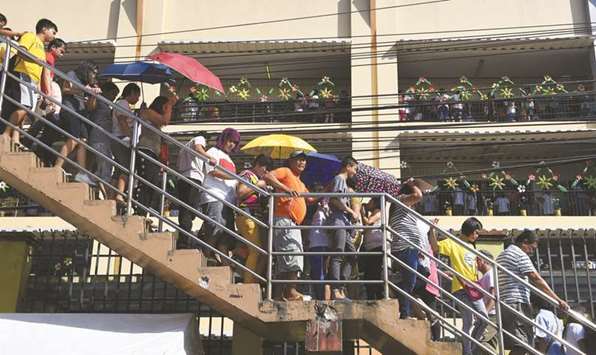Christopher Lawrence “Bong” Go, special assistant to the president, confirmed reports that the president, who was supposed to vote in Davao City, was a no-show, but did not state the reason for his non-appearance.
Go himself voted at Buhangin Central Elementary School in Davao City.
It would have been the first time for Duterte to exercise his right to vote as president.
Duterte is a registered voter at Daniel Aguinaldo National High School in Davao City where his daughter, Mayor Sara Duterte-Carpio, was able to vote.
Teachers at the secondary school had brought out of a glass case the school chair used by Duterte to fill up his ballot in the 2016 elections, in anticipation of the president’s arrival.
The Board of Election Tellers in the school closed the polls at 3:05pm. Duterte was to fly back to Manila to preside over the oath-taking ceremony in Malacanang of Bernadette Romulo-Puyat as the new Tourism secretary.
In 2016, Duterte said he favoured the postponement of the village elections as it would save the government billions of pesos and protect the lowest unit of government from the influence of drug syndicates.
“Do you know the reason why I also agreed with some congressmen to postpone the barangay elections?
Because I am afraid that the drug money will seep into the electoral process,” Duterte said on August 26, 2016, at the 10th anniversary of the Eastern Mindanao Command in Davao City. Duterte signed in 2017 Republic Act 10952, which postponed the village and Sangguniang Kabataan (SK) or youth council elections to the second week of May 2018.
Duterte had asked the Philippine Drug Enforcement Agency to release the list of barangay officials linked to illegal drugs to guide voters.
Vice President Maria Leonor “Leni” Robredo urged voters to place importance on the barangay and SK polls, after seeing fewer voters at her precinct in Tabuco Elementary School in Naga City compared with the national elections in 2016.
“I have observed that there are not a lot of voters. There are no lines. It is sad that there are fewer people interested when it comes to voting in barangay elections. We need to remind the public that barangay elections is important because it is the barangay which provides frontline assistance and other services to the public,” said Robredo, who cast her vote together with her daughter Tricia at about 10am.
“And to think that there is also an ongoing youth polls. We are expecting more people in the voting precincts because it is crucial for us to choose village officials who will be dedicated in serving their constituents,” she added.
Robredo’s former colleagues in Congress called for drug-free villages. Rep. Ron Salo of Kabayan party-list called on the Department of the Interior and Local Government to conduct random drug-testing of the elected barangay and youth council officials, while Rep. Robert Ace Barbers of Surigao del Sur called on newly-elected officials to sign a covenant to make their villages drug-free within a year after assumption from office.
“The campaign against illegal drugs starts at the grassroots level and every barangay official plays a vital role in eliciting and herding citizen’s participation in the local anti-drug campaign. The signing of covenants would indicate their earnest desire in ensuring that there are no drug addicts or pushers among their constituents,” Barbers said.
Salo said random drug tests were in accordance with the Dangerous Drugs Act, which states that “officers and employees of public and private offices, whether domestic or overseas, should be subjected to a random drug test as contained in the company’s work rules and regulations, which shall be borne by the employer, for purposes of reducing the risk in the workplace.”
The same law provides that “any officer or employee found positive for use of dangerous drugs shall be dealt with administratively which shall be a ground for suspension or termination, subject to the provisions of Article 282 of the Labour Code and pertinent provisions of the Civil Service Law.”
“Election victors must set good example by submitting themselves to drug-testing procedures to inspire confidence among their constituents both those who voted for them and those who did not. Only law-abiding citizens can hold public offices,” Salo said in a statement.
Election-related violence kills 35 since mid-April
At least 35 people have been killed in shootings and attacks in recent weeks related to nationwide local elections in the Philippines, police said yesterday.
Twenty-seven people were also wounded in the incidents, recorded from April 14, when the election period began, said Chief Superintendent John Bulalacao, national police spokesman.
Bulalacao said 18 of those killed were incumbent local government officials, while five were candidates in the village elections. In similar village elections in 2013, 33 people were killed and 55 wounded in poll-related incidents, he noted.
Nearly 60mn Filipinos were eligible to vote for more than 620,000 village officials and about the same number of representatives to youth councils across the country. Sporadic reports of vote buying, voter disenfranchisement and other irregularities swamped election officials, but authorities described the polls as generally peaceful.

